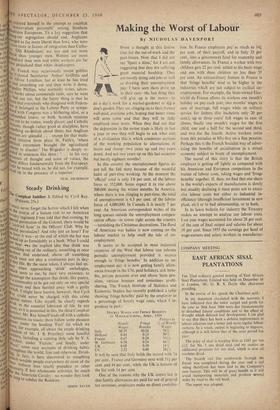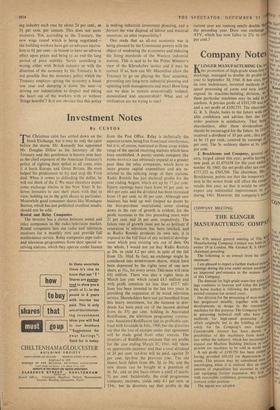Making the Worst of Labour
By NICHOLAS DAVENPORT SPARE a thought at this festive time for the out-of-work and the part-timers. Note that I did not say 'Spare a dime,' for 1 am not suggesting that they are suffering great material hardship. They are mostly doing odd jobs as well is drawing their unemployment pay. I have seen them drive up in their cars—the last thing they
will give up is the motor to do a day's work for a market-gardener or djg a don's garden. They are clinging on to their former well-paid, overtime jobs, hoping that better times will soon come and that they will be fully employed once more. When they find out that the depression in the motor trade is likely to last a year or two they will begin to ask what sort of a civilisation this is which condemns sections of the working population to alternations of boom and slump--two years up and two years down. And not two years up on this last occasion but barely eighteen months!
In this country the unemployment figures do
not tell the full story because of the wasteful habit of part-time working. At the moment the `official' total is only 1.6 per cent. of the labour force or. 352,000. Some expect it to rise above 500,000 during the winter months. In America, where there is less clinging to part-time, the total of unemployment is 6.3 per cent. of the labour force of 4,000,000. In Canada it is nearly 7 per cent. An American correspondent writes of the long queues outside the unemployment compen- sation offices—in towns right across the country —tarnishing the Christmas decorations. The flood of American war babies is now coming on the labour market to help swell the tide of un- employment.
It seems to be accepted in most industrial countries of the West that labour can tolerate periodic unemployment provided it secures enough in 'fringe benefits.' In addition to un- employment pay it is now getting family allow- ances (except in the US), paid holidays, sick bene- fits, private pensions over and above State pen- sions, various bonuses and sometimes profit- sharing. The French Institute of Statistics and Economic Studies has recently published a table showing 'fringe benefits' paid by the employer as a percentage of hourly wage rates, which I re- produce in part :
HooRi WAGI:s AND FRINGE BENEFITS IN \1 Al.:lll:Al1MNG, APRIL, 1959
Fringes as
lervurlc Fringe c;(, of Hourly Benefits
Wages
Italy . . $0.35 $0.26 74% Holland . , 0.44 0.13
Germany 0.54
543014.
W-. France .. 0.47 0.24 0,24 , UK .. .. 0.68 0.10 14'Y US .. 2.22 0.46 201% It will be seen that Italy holds the record with 74 per cent., France and Germany next with 511 per cent. and 44 per cent., while the UK is bottom of the list with 14 per cent.
One of the reasons why the UK comes last is that family allowances are paid for out of general tax revenues; employers make no direct contribu- tion. In France employers pay. as much as 14+ per cent. of their payroll, and in Italy 33 per cent., into a government fund for maternity and family allowances. In France a worker with two children gets 22 per cent. added to his basic wage and one with three children no less than 55 per cent. An extraordinary feature in France is that 'fringe benefits' tend to be higher in the industries which are not subject to cyclical un- employment. For example, the State-owned Elec- tricitd de France allows its workers one month's holiday on pay each year, two months' wages in case of marriage, full wages while on military service for fathers (for bachelors only 20 per cent.), up to three years' full wages in case of illness, finally one month's wages for the first child, one and a half for the second and third, and two for the fourth. Active workers retire from this paradise at fifty-five on a fine pension. Perhaps this is the French Socialist way of adver- tising the benefits of socialisation in a mixed economy subject to bouts of unemployment.
The moral of this story is that the British employer is getting off lightly as compared with his American and European competitors in the matter of labour costs, taking wages and 'fringe benefits' together. lf, then, we find that our share in the world's exports of manufactures is slowly but steadily declining it must point not to exces- sive labour costs but either to industrial in- efficiency (through insufficient investment in new plant, etc.) or to bad salesmanship, or to both.
In its latest bulletin for industry the Treasury makes an attempt to analyse our labour costs. Last year wages accounted for about 28 per cent. of the cost of final output and salaries for about 16 per cent. Since 1955 the earnings per head of wage-earners and salary workers in manufactur-
ing industry each rose by about 24 per cent., or 54 per cent. per annum. This does not seem excessive. Yet, according to the Treasury, the new wage round which is being negotiated—. the building workers have got an advance equiva- lent to 64 per cent.—is bound to have an adverse effect upon prices and bring to an end the long period of price stability. Surely something is wrong, either with British industry or with the direction of the economy by the Treasury. Is it not possible that the monetary policy which the Treasury employs—giving the economy a boost one year and damping it down the next—is driving our industrialists to despair and taking the heart out of the workers with or without `fringe benefits'? Is it not obvious that this policy is making industrial investment planning, and a fortiori the wise disposal of labour and material resources, an utter impossibility?
One reads that an all-out economic war is being planned by the Communist powers with the object of weakening the economics and reducing the living standards of the Western industrial nations. This is said to be the Prime Minister's view of the Khrushchev tactics and it may be correct. If so, how can Mr. Macmillan allow the Treasury to go on playing the 'free' economy, preventing any long-term industrial planning and upsetting both managements and men? How long can we dare to remain economically isolated, demoralised and uncontrolled? What sort of civilisation are we trying to run?



























 Previous page
Previous page